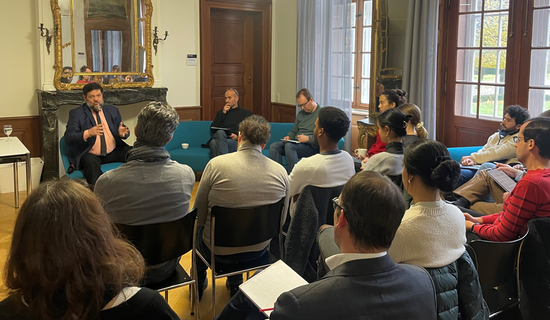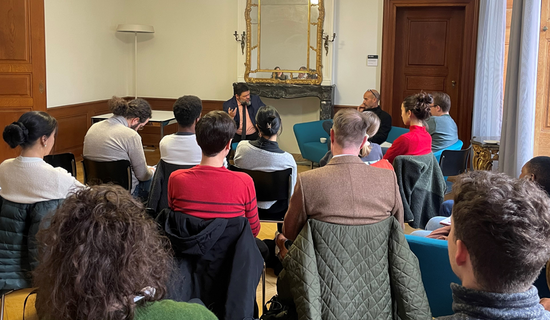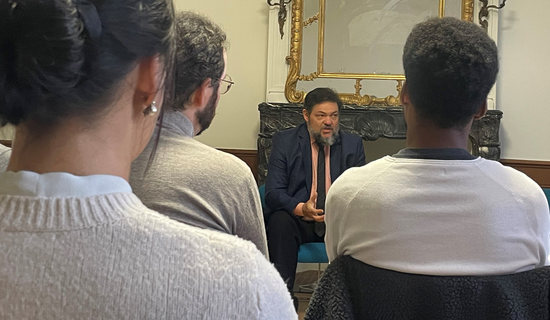/ News, Forschung, Events, Weitere
Salon Discussion with José Augusto Fontoura Costa: «A Brazilian View of International Law and Global Politics»



Prof. José Augusto Fontoura Costa from São Paulo University’s Law Faculty – our new Katekisama partner institution – paid a visit to the Sandgrube Salon on 19 November 2024 and presented a fascinating overview of international relations and law from a Brazilian perspective.
Prof. José Augusto Fontoura Costa provided a broad tour d’horizon on Brazil’s history and its role in the world. Input from the audience – a full house – kept things lively from start to finish. The atmosphere was especially warm. A question from amongst the contingent of first and second semester MA students, for example, probed Brazilian attempts at forging global connections and diversifying trading partners in the realm of political economy, given the highly circumscribed international security environment that the professor foregrounded. The keystone of this remains the United States’ so-called Monroe Doctrine, casting a large shadow over the entire Western Hemisphere from 1823 to last weekend’s public comment by Brazil’s first lady at Elon Musk’s expense – to which there were no objections in the Salon, only a healthy dose of laughter all around.
Relations between Brazil and other former Portuguese colonies such as Macao, Angola, East Timor and Goa were the focus of another question. We learned how the US-backed military junta seized power at a key moment during the 1960s decolonisation movement, meaning the Monroe Doctrine’s effects were truly global during the Cold War, with Brazilian support for Mozambique’s struggle being lukewarm at best, and Angola reliant on the much smaller island of Cuba instead.
The discussion then shifted towards the pressing issue of judicial independence, which has worryingly been under threat from rightwing authoritarianism around the world in recent years – whether in Brasília, Budapest, Jerusalem, Warsaw or Washington, DC. While acknowledging that corporate corruption occasionally afflicts low and mid-level courts and arbitration processes, the professor emphasised the particular susceptibility of national-level judicial bodies to political capture.
An insightful remark cautioned against over-reliance on more progressive policymaking by activist judges. “Legislating from the bench” – as the practice is sometimes known – can indeed have adverse consequences in the long run despite good intentions. Prof. Fontoura Costa put it simply: “That’s what parliaments are for.” Accordingly, he cast a degree of doubt on the significance of the rather liberal composition of Brazil’s Supremo Tribunal Federal as compared with its notorious counterpart in the reactionary US Supreme Court.
The rhetoric vs reality of the BRICS alliance again came into question towards the end of the discussion. Perhaps this was on account of the much publicised Kazan Conference last month. The professor was doubtful whether the BRICS could boast much in the way of concrete achievements over the past decade, despite the early potential of the loose alliance.
Director Corey Ross expressed astonishment at the proliferation of law degree holders in Brazil, which, “unlike the United States, isn’t known to be a particularly litigious country.” Well over a million graduates – as many as 1% of the population – have passed through law schools throughout the land, including Faculdade de Direito da Universidade São Paulo. Its recent Katekisama partnership agreement with the EIB is a great sign of things to come – especially if this rich and engaging salon discussion is anything to go on.
José Augusto Fontoura Costa is Associate Professor and Deputy Head of the Department of International Law at the Faculty of Law of the University of São Paulo, Brazil, where he received a PhD in International Law in 1998. His main research interests are foreign investment, international regimes, globalization, public international law and international investment agreements.



